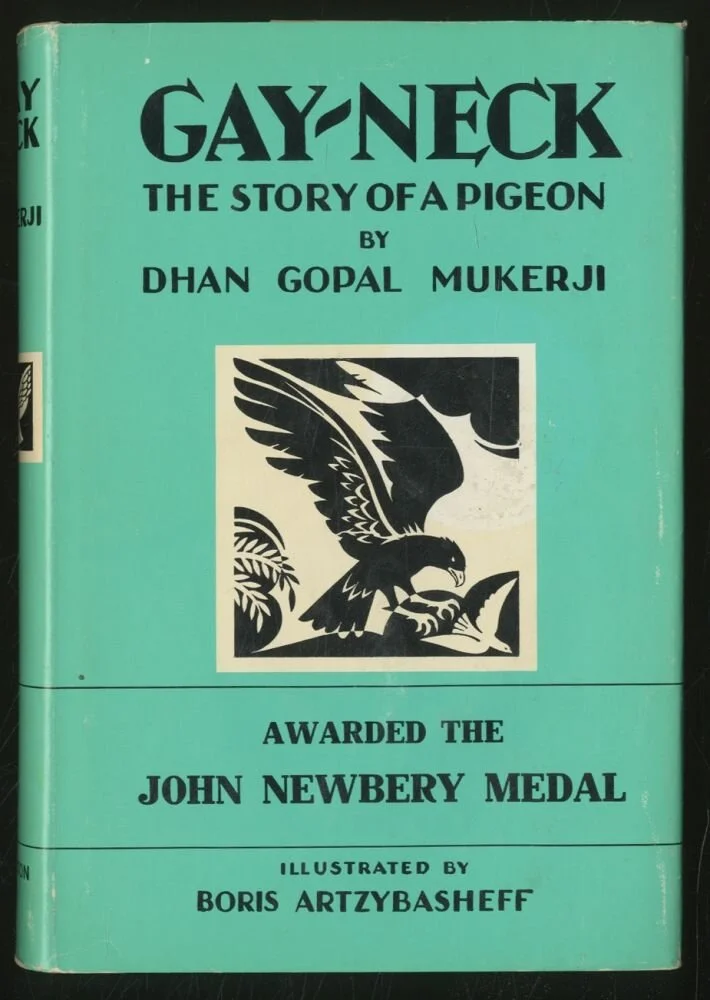Gay-Neck (1928)
Gay-Neck by Dhal Gopal Mukerji
Gay-Neck is, hands down, the best title to win the Newbery Medal as of 2020. What is a gay-neck? Why is it hyphenated? What makes it gay? Is it only the neck that’s gay, or are some other body parts at least bi-curious? The subtitle, The Story of a Pigeon, only adds to the mystery. Is it a book about a gay pigeon? Is there something particularly gay about pigeon necks? Alas, Gay-Neck is not the best book to win the Newbery Medal, as it’s simply a story about a pigeon named Gay-Neck. Boo.
The Newbery selection committee’s xenophilia in the first decade of the Medal led to some awkward, uncomfortable choices. Gay-Neck represents a major first for the Newbery, as author Dhan Gopal Mukerji was the first nonwhite author to win the award. Like every winner thus far besides Smoky, we’re headed back out of the US, but this time it’s with a culturally appropriate guide, someone who lived the life he wrote about.
And what a fascinating life it was. Mukerji grew up in a small village near Calcutta during the period of British rule. Indian society was controlled by a strict caste system, governed by British colonial forces, and generally not a place you wanted to be caught stirring shit up. But like all oppressive environments, it also served as a breeding ground for resistance. Mukerji’s younger brother, Jadu, ended up imprisoned for four years for his participation in the Bengali independence movement, an action that spurred Mukerji’s own interest in overthrowing their English overlords. As soon as Jadu got out of jail, he and Dhan fled the country.
After a brief stint in Japan, Mukerji boarded a ship for San Francisco. Penniless but scrappy, he quickly befriended the city’s political outsiders and artists, married an American painter, and started writing poems to fund his stints at UC Berkeley. By age 24, he’d earned a graduate degree in metaphysics from Stanford. But his heart was still in India, his ire still directed at the British Empire.
You wouldn’t guess any of that from reading Gay-Neck. It’s a slight, unassuming piece that skews closer to Smoky the Cowhorse’s realism than Dr. Dolittle’s anthropomorphism, but unlike Smoky, there’s not a consistent story, style, or even order to the book. Gay-Neck reads almost like a literary collage, pulling in chapters that read as animal husbandry instruction manuals, observational biology, parables, and war thrillers, slapping them all together with little coherence. On several occasions, Mukerji abandons his narration and writes from the perspective of Gay-Neck, whose hilariously overstuffed formalisms make him sound like Henry Higgins. I can only assume that Mukerji’s intention wasn’t to give a British-upper-class voice to his bird (considering his personal feelings toward the Empire), but it makes for a confounding read.
Speaking of confounding, some of the stories Mukerji tells are mind boggling in their carelessness. Gay-Neck’s young owner (never named) lets his pigeons loose in a storm to see if they can survive the weather. (Spoiler alert: daddy pigeon can’t.) He lets Gay-Neck and his mate out of their cages in front of an eagle aerie, after describing exactly how dangerous eagles are to the birds. I know I’m supposed to think the kid loves his birds (he never shuts up about how much he loves his birds), but a lot of Gay-Neck reads as weirdly sadistic, and it’s not particularly fun.
With all that said, the last chapter of the book is the most subtly beautiful piece of writing I’ve yet encountered in the Newbery winners. After flying for the British in WWI, Gay-Neck is suffering from an animal sort of PTSD. To cure him of his fear, Gay-Neck’s owner and his older friend, Ghond, must travel through the jungle to a lamasery in the mountains. The lamas charge Ghond with rescuing a nearby village from a buffalo who suffers from the same disease, leading to a bloody conclusion that presents grief, trauma, and healing in surprisingly complex ways for a children’s book. After reading the book up to that point, it’s completely shocking in its mastery, a deeply touching metaphor that I’ve chewed on for hours since wrapping up the book last week.
Because of his outspokenness against the British, Mukerji was never able to return home to India. His exile made him feel increasingly unhappy and isolated in the States, and at age 46, he hung himself. It’s a tragic ending to an extraordinary life. And though Gay-Neck stands out today for its title more than its content, Mukerji more than proves his worth as a writer in those last 30 pages.



